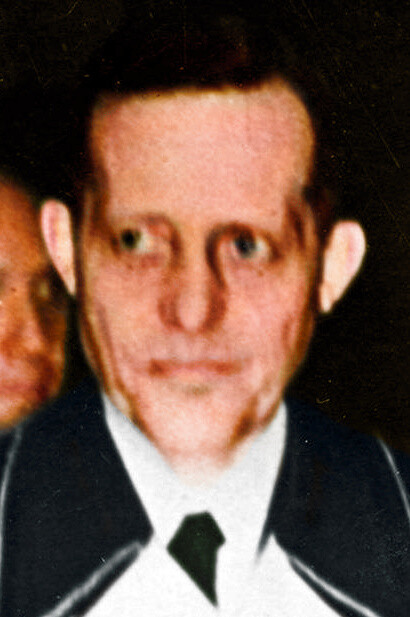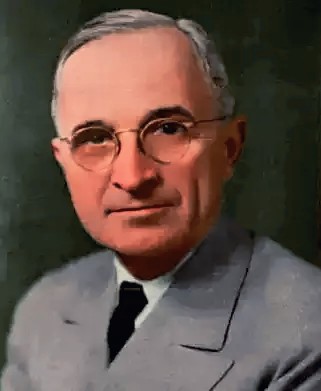Appeal follows surrender signing
By Boyd D. Lewis, United Press staff writer
Here is an eyewitness account of Sunday’s surrender at Reims by one of the seven American news and radio reporters who saw it take place. This story was filed at 8 a.m. Monday (2 a.m. ET) with censorship at Supreme Allied Headquarters in Paris for transmission as soon as the official embargo was lifted.
REIMS, France (May 7, delayed) – Representatives of our Allied powers and vanquished Germany scrawled their names on a sheet of foolscap in a map-lined 30-by-30-foot room at 2:41 a.m. CET today (8:41 p.m. Sunday ET) and ended World War II in Europe.
I witnessed this historic scene.
In a ceremony exactly 20 minutes long, Col. Gen. Gustav Jodl, chief of staff of Adm. Doenitz’s government and long-time close friend of Adolf Hitler, surrendered all German armed forces on land, sea and in the ar.
Effective tonight
The surrender is effective one minute after midnight Wednesday, British Double Summer Time (6:01
p.m. ET).
A high officer said almost all firing had ceased on the remaining fronts.
The actual signing took five minutes. There are four copies of the surrender document, and in addition the naval disarmament order, which was signed by Adm. Sir Harold Burroughs, Allied naval chief.
Immediately after signing the last document with a bold “Jodl,” the Nazi arose, bowed and in a broken voice pleaded for generosity “for the German people, the German armed forces,” who he said “both have achieved and suffered more perhaps than any other people in the world.”
Eisenhower smiles
Gen. Dwight D. Eisenhower, smiling, confident and restrained, sat with his deputy, Britain’s Air Chief Marshal Sir Arthur Tedder, beside him. In a three-minute statement later for newsreels, Gen. Eisenhower hailed the German surrender as the conclusion of the plan reached by President Roosevelt and Prime Minister Churchill at Casablanca in 1942 – unconditional surrender.
“We have defeated Germany on land, sea and in the air,” Gen. Eisenhower said. He added that the peace was fittingly signed in France, a country which suffered so much at the hands of Germany and whose liberation started on D-Day, just 11 months ago yesterday (Sunday). Gen. Eisenhower did not attend the actual signing. That was carried out by generals of America, Russia, England and France on his behalf.
After signing the last sheet, Jodl arose and Gen. Adm. Hans Georg Friedeburg and Jodl’s aide. Maj. Wilhelm Oxinius, jumped up with him.
Speaks in German
Lt. Gen. Walter Bedell Smith, who signed for Anglo-American forces as SHEAF chief of staff, asked Jodl to meet him at 10 a.m. Monday to arrange for German liaison officers to carry out the surrender and disarmament orders,
‘Suffered more’
Jodl stood with eyes half shut, leaning slightly forward, and said in English. “I want to say a few words.” Then he spoke rapidly in German in a voice which seemed on the point or cracking once or twice:
General, with this signature the German people and the German armed forces are for the better or worse delivered into the victors’ hands.
In this war which has lasted more than five years, both have achieved more and suffered more perhaps than any other people in the world.
I express hope the victor will treat them with generosity.
Ten minutes later he was presented before the supreme commander. Gen Eisenhower stood very grim at his desk in his cubbyhole office and asked if Jodl understood the terms he would carry out.
Jodl muttered “yes.”
The Germans’ heels clicked and they strode out, Jodl tripping on a camera floodlight cable.
60 see surrender
The war was ended at a black-topped table 20 by six feet, bathed in floodlights which heated the tiny “war room” almost insufferably.
Some 60 spectators, including 16 correspondents, gathered shortly before 2 a.m.
The presiding general, Smith, entered the room at 2:29.
At 2:39, the three Germans entered.
Jodl clicked his heels to Smith. There was no saluting. The three Germans sat down, facing these Allied officers:
Lt. Gen. Sir Frederick E. Morgan (deputy chief of staff), Gen. Francois Sevez (representing the French Chief of Staff, Gen. Alphonse-Pierre Juin), Adm. Sir Harold M. Burroughs (Allied naval chief), Gen. Smith (presiding), Gen. Susloparov, Gen. Carl Spaatz (commanding the U.S. Strategic Air Force), Air Marshal Sir J. M. Robb (chief of the air staff of SHAEF), Maj. Gen. H. R. Bull (assistant chief of staff, G-3, SHAEF), and Col. Zenkovitch (aide to Gen. Susloparov).
Embraces Ike
Gen. Susloparov smiled frequently during the ceremony. Afterward, in Gen. Eisenhower’s office, he and Ike laughed and embraced and congratulated one another.
Gen. Smith signed for the British and Americans, passing the surrender from the Frenchman on his right to the Russian on his left. Jodl was the last to sign.
The scene of the surrender was a classroom of Reims’ Ecole Professionelle, co-educational technical school. The Germans had used it as supreme headquarters during their occupation and Gen. Eisenhower made it his SHAEF forward post since moving from Versailles several months ago.
Started Wednesday
Negotiations began last Wednesday evening when Friedeburg, who succeeded Doenitz as commander-in-chief of the German Navy when Doenitz became Fuehrer, surrendered the northern armies, exclusive of Norway, to Field Marshal Sir Bernard L. Montgomery.
Friedeburg and the other German representatives were brought to Reims Saturday.
Friedeburg, who complained he had had little sleep during the past 10 days and who had slept most of the way in the plane and limousine, asked for a chance to wash up.
The Admiral hummed softly while washing up but his aide, Col. Fritz Poleck, appeared nervous.
Meet at 5:20
The first meeting took place at 5:20 o’clock Saturday.
Present, in addition to Gen. Eisenhower were Maj. K. W. D. Strong (G-2 Supreme Headquarters), Gen. Spaatz, Adm. Burroughs, Maj. Gen. H. R. Bull (assistant chief of staff), Marshal Robb, Capt. Harry C. Butcher (naval aide to Gen. Eisenhower), Col, R. G. S. Philmore (who drafted the surrender terms), and Maj. Ruth M. Briggs of the WAC (secretary chief of staff).
That meeting lasted 20 minutes – long enough to reveal that Friedeburg did not have authority to lay surrender on the line.
Gen. Smith demanded his credentials to commit Doenitz. Friedeburg was willing, but he did not have the proper credentials.
Gen. Smith therefore gave the Admiral the written terms.
Tries to compromise
Friedeburg tried to compromise; he complained many German soldiers might be killed by the Russians unless allowed to surrender directly to the Allies in the west.
Gen. Smith gave the suggestion no consideration. He declared the Allies were not prepared to discuss anything but simultaneous surrender to the Allies of the east and west.
Friedeburg asked about the German civilian population which he said might suffer hardships. Gen. Smith replied that the German people were enemies of the Allies until surrender; after that, he said, we would be guided by the dictates of humanity.
Friedeburg and an aide then took the terms to an office and mulled them over while washing down sandwiches with whisky. Washington, Moscow and London were given code dispatches by Gen. Eisenhower on the progress of the negotiations.
Guarded by MPs
Three teams of MPs guarded them. They included Frederick Stone of Pittsburgh.
Prime Minister Churchill telephoned several times for information during the evening and Gen. Smith conferred with Gen. Eisenhower.
Saturday night, Friedeburg sent a message to Doenitz via the British Second Army.
Friedeburg said he had two proposals from SHAEF, first, that he be empowered to surrender all theaters, and alternately Doenitz send his chief of staff and commander-in-chief of the army, navy and air forces with the necessary authority.
The Germans then were escorted to their billet.
The big day
Sunday morning dawned full of portent – just 11 months to the day after Normandy D-Day. Gen. Eisenhower had told the correspondents recently his original plans in England envisaged possibly reaching the German border by the end of the 12th month after D-Day.
The day passed in eager waiting for Doenitz to reply.
At precisely 5:08 p.m. Sunday, the reply arrived at Reims airport im an Allied military plane in the person of Gen. Gustav Jodl – the man with the credentials – the man with power to lay surrender on the line. He was accompanied by Maj. Oxinius.
The party of correspondents representing the news agencies and networks of the world arrived 10 minutes after Jodl. They waited in the main hall of the map-lined conference room.
Details told
Details of what had gone on were given the news representatives by two public relations department officers who had been the official reporters at the first negotiations.
“This will be your first uncensored story – when the surrender is completed censorship goes off,” Brig. Gen. Frank Allen Jr. of Cleveland, director of SHAEF press relations, said.
The correspondents enjoyed a laugh at the expense of British Col. George Warren and Lt. Col. Richard Merrick of Chicago, chief SHAEF censors who were present – without blue pencils.

